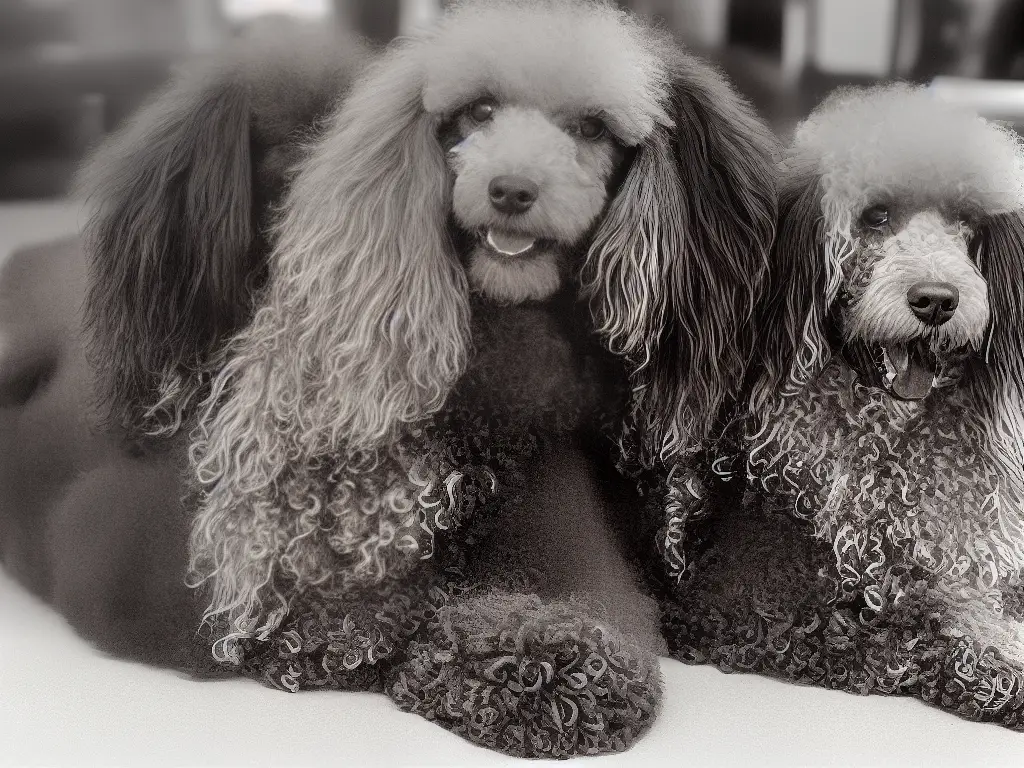Poodle Mix Possessiveness and Training
Owning a poodle mix can be a delightful and rewarding experience, as these intelligent and loving dogs bring joy to many households. However, possessiveness can sometimes arise as a challenge in these unique breeds, potentially leading to troublesome behaviors and strained relationships with other pets and family members. In this essay, we will explore the reasons behind possessiveness in poodle mixes, identify the signs of this behavior, and provide effective strategies to manage and prevent these issues from escalating. By understanding the root causes and utilizing proper training techniques, you can create a harmonious living environment for your poodle mix and foster a loving, well-behaved companion.
Understanding Poodle Mix Breeds
Poodle mix breeds are a popular choice for those looking for a dog with a unique set of characteristics, such as intelligence, low-shedding coats, and charming personalities. Poodle mixes combine the traits of one breed with those of the poodle, resulting in a distinct and lovable dog.
Some of the most popular poodle mix breeds include the Labradoodle, Cockapoo, and Goldendoodle. It’s important to understand the unique traits of these breeds to effectively manage and train your dog, especially when it comes to possessiveness.
Possessiveness is a common behavioral issue in dogs and is typically associated with resource guarding. While it’s natural for dogs to protect their food, toys, or territory, excessive possessive behavior can cause problems with other pets or family members.
Early socialization and proper training can help prevent and manage possessive behavior in poodle mix breeds. Each breed may exhibit different levels of possessiveness depending on inherited traits from their non-poodle parent breed.
Labradoodles are known for their friendly and outgoing nature, making them less likely to exhibit extreme possessiveness behaviors. Cockapoos, on the other hand, may be more prone to possessiveness due to their strong bond with their owner and natural tendency to be more sensitive and cautious.
Understanding your poodle mix breed’s specific traits can help predict potential behavioral issues and enable you to address them more effectively. Reward-based training and introducing your dog to various environments, people, and animals can also help decrease the likelihood of possessive tendencies.
It’s essential to keep in mind that breed influences only partially contribute to possessiveness, as each dog is an individual with their own experiences, environment, and personality. Certain breeds, such as poodle mixes, can have higher instances of possessive tendencies than others. Poodle mixes are highly intelligent and tend to form strong bonds with their owners, which can lead to possessive behaviors.

Possessiveness in Dogs
By understanding the various factors that can contribute to possessiveness in dogs, which include genetics, upbringing, socialization, and health, you can ensure a happy and harmonious relationship with your poodle mix for years to come. Proper training and socialization in poodle mixes are crucial to managing and preventing possessive tendencies, helping both you and your dog thrive within your bond.
Upbringing is a crucial factor in the development of possessive behaviors in poodle mixes. Dogs that are not properly trained or socialized during their early months may exhibit possessive tendencies. This can manifest as resource guarding, where the dog becomes possessive of food, toys, or its owner. Early socialization and consistent training can help curb possessive tendencies and teach your poodle mix to share and be comfortable around others.
Health also plays a role in causing possessive behaviors in poodle mixes. Illness or pain can trigger anxiety or fear in dogs, causing them to become possessive of their environment and belongings. Regular veterinary checkups and consistent exercise and diet plans can help minimize possessive behaviors related to health issues.
Environment and socialization are essential factors that can influence your poodle mix’s possessive behavior. Dogs that are isolated from other animals or people can become insecure, fearful, and more likely to exhibit guarding or possessive behaviors. A well-socialized poodle mix will be exposed to various situations, environments, and individuals during their formative months and will continue to interact with others throughout their life. This exposure to diverse experiences and interactions will aid in minimizing possessive tendencies in your poodle mix and make them a well-rounded, confident, and content companion.
Understanding your poodle mix’s possessiveness is crucial for pet enthusiasts or hobbyists who want to build a healthy bond with their furry friend. Possessiveness often results from fear, anxiety, or an innate guarding instinct, and approaching the issue with empathy and patience can make all the difference. By using positive reinforcement and providing structure in your poodle mix’s life, their trust in you and the world around them will grow, ultimately leading to a decrease in possessive tendencies and fostering a more harmonious relationship.

Recognizing Possessive Behaviors
Poodle mix possessiveness, a common behavioral issue, is often seen in many dogs, especially in breeds known for their intelligence and loyalty. To ensure the well-being of your pet and to avoid complications, it is essential for owners to be aware of the warning signs of possessiveness. Recognizing these behaviors early on will allow you to employ appropriate training methods and strategies to address the issue, ensuring a happy, secure, and loving bond between you and your poodle mix.
One typical sign of possessiveness in poodle mixes is the guarding of objects or resources, such as toys, bones, or even clothing items. Another sign is food guarding, which entails the dog showing aggressive or controlling behaviors around their food, such as growling, snapping, or trying to prevent others from approaching the food area. This type of possessiveness can manifest itself in various degrees, from being mild to being severe. In some cases, it may lead to dangerous situations such as biting or other aggressive actions to protect their food.
Similarly, poodle mix possessiveness may also include guarding specific areas or spaces, such as beds, crates, or even rooms in the house. This behavior is often observed when the dog exhibits aggressive tendencies or tries to block access to these spaces for other people or animals. This territorial mindset may stem from insecurity or fear and controlling these spaces makes them feel more secure.
It’s crucial to address these possessive behaviors as they can lead to potential risks for both the dog and anyone interacting with it. Aside from the obvious physical dangers that could arise from aggressive guarding, it may also stifle the dog’s ability to socialize with other dogs and hinder its quality of life. Furthermore, it’s essential to understand that these behaviors are not necessarily driven by malice but rather an instinct to protect and secure what they deem as essential for their well-being.
Early intervention and proper socialization are key in preventing and mitigating possessiveness in poodle mixes. Implementing consistent and positive training methods, such as using rewards and reinforcement when the dog displays relaxed behavior around their objects or resources, can be beneficial. Additionally, exposing the dog to different people, animals, and environments, while maintaining a calm and non-threatening atmosphere, can create a well-rounded and healthy social life for the dog. By addressing and understanding poodle mix possessiveness, a better, safer relationship between dog and owner can be cultivated, fostering a more harmonious and enjoyable environment for everyone involved.

Dog Training and Behavior Modification Techniques
One of the most effective methods to tackle poodle mix possessiveness is through positive reinforcement training, which involves rewarding desirable behavior with treats, praise, or toys in order to increase the likelihood of the dog displaying the desired behavior again. This ties in with the importance of consistency and using rewards for good behavior, as mentioned in the previous paragraph. When your poodle mix displays appropriate, non-possessive behavior or avoids guarding its possessions, immediately praise and reward them. This will help your dog understand that sharing and non-possessive behavior will earn them rewards, thereby encouraging a positive association with these actions and contributing to a more harmonious home environment.
Redirection is another useful technique in addressing poodle mix possessiveness. When the dog starts showing signs of possessiveness, like growling or tensing up when someone approaches their belongings, immediately redirect their attention to a more appropriate activity. For instance, you can lead them away from the object with a toy or treat, and then engage them in a game or simple obedience commands like “sit” or “stay.” By doing this, you’re not only taking their focus away from the object of their possessiveness but also teaching them to engage in more desirable behavior.
Desensitization plays a vital role in modifying your poodle mix’s possessive behavior. The main aim is to eliminate the dog’s emotional response to the perceived threat that triggers their possessiveness. It requires gradually exposing the dog to the stimuli causing possessiveness while ensuring they remain comfortable and relaxed throughout the process. For example, you can start by making non-threatening movements or sounds near the dog’s belongings while rewarding them for staying calm. Gradually increase the level of interaction, always rewarding them when they remain relaxed. This will help your poodle mix build a positive association with people near their possessions and reduce their possessive tendencies.
Counter-conditioning is another technique that works well in tandem with desensitization. Through counter-conditioning, you can change your poodle mix’s negative emotional response towards perceived threats to positive responses. For example, when introducing new people or dogs to your poodle mix’s environment, reward them as the new addition gets closer, creating a positive experience rather than one of fear or anxiety. Over time, this will help your dog replace its possessive instincts with a more positive and welcoming behavior.
Consistency is crucial in modifying and managing your poodle mix’s possessive behavior. It’s essential to ensure all family members and visitors are on the same page and implement the same techniques when interacting with the dog. This consistency will help the poodle mix understand the expected behavior and adjust accordingly. Additionally, make sure to be patient during the process, as behavior modification takes time and dedication. With persistence, your poodle mix will learn healthier ways to interact with their environment and reduce possessiveness, resulting in a more harmonious relationship between you, your dog, and others.

Socialization and Preventing Possessive Behaviors
Apart from consistency, proper socialization is crucial during the critical developmental period of your poodle mix, as it plays a significant role in preventing possessive behaviors from forming. Poodle mixes, just like any other breed, can have a predisposition to resource guarding, which may lead to aggression if not addressed in time. Socialization is the process of exposing your dog to various situations, people, and animals, allowing them to become comfortable and confident in different environments. The critical period for socialization occurs from about 3 weeks to 14 weeks of age, but continuing socialization throughout their life is recommended, which will complement the consistent approach in managing possessive behavior, ultimately ensuring a well-adjusted and well-behaved dog.
Introducing your poodle mix to different types of people, other dogs, and animals can help curb possessive behaviors. By doing so, they will learn to be more accepting of new situations and less likely to exhibit aggressive behaviors. One essential aspect of socialization involves positive reinforcement. Reward your dog with praise or treats when they display positive interactions with people or animals. This way, they start to associate these experiences with positive feelings.
There are several methods to socialize your poodle mix early in life. Puppy classes are a great place to begin, as they provide a controlled environment where your puppy can become accustomed to other dogs and new people. Group obedience classes also offer ample opportunities for socializing your dog with humans and animals. Additionally, regular trips to dog parks or playdates with other dogs can help your poodle mix learn essential social skills and prevent possessive tendencies.
Moreover, teaching your dog to be tolerant and even enjoy handling can also prevent possessive behaviors. Make it a habit to touch their muzzle, paws, ears, and tail gently and praise or reward them when they remain calm. This handling will make future grooming, vet visits, or interactions with children safer and more manageable for both you and your dog.
Addressing any issues pertaining to resource guarding and possessive behavior in poodle mixes should happen as soon as possible. Adopting training methods such as the “nothing in life is free” approach can help establish yourself as a gentle leader, teaching your dog to look up to you for guidance, and understand that resources are not scarce. This technique involves asking your dog to complete a task, such as “sit” or “down,” before they receive something they want, like food or affection. With a consistent and positive approach to socialization and training, you can effectively prevent possessive behaviors in your poodle mix.

Managing and Redirecting Possessiveness
As a continuation of training strategies, managing possessive behaviors in your poodle mix is also crucial. One effective way is through redirection. When you notice your dog displaying possessiveness, it’s essential to quickly and calmly redirect their focus to a different activity. This can be achieved by engaging your dog in a simple obedience command, such as ‘sit’ or ‘down,’ or encouraging them to play with a toy that they are permitted to have. The goal of this approach is not only to prevent possessive behavior from escalating but also to teach your poodle mix appropriate ways to channel their energy, thereby creating a smooth and cohesive training process.
Time-outs can also be an effective way to manage and discourage possessiveness in poodle mixes. If your dog exhibits possessive behavior that is not redirected through the above methods, consider giving them a brief time-out in a separate room or a designated ‘time-out space.’ This will allow your dog to calm down and reflect on their actions, enabling you to regain control over the situation. Remember that time-outs should be brief, no longer than a few minutes, and should never be used as a punishment. Instead, think of them as a way for your dog to reset their behavior.
Consistently communicating clear expectations is another vital aspect of managing possessiveness in poodle mixes. It’s essential to establish boundaries and rules for your dog from the beginning, as well as to reinforce these expectations regularly. By consistently enforcing your expectations, you will eventually show your dog that possessive behavior is unnecessary and undesired. For example, if your poodle mix is not allowed to guard their food bowl, consistently practice feeding them and removing the bowl, showing them that they do not need to be protective of their food.
Patience plays an essential role in overcoming possessive behaviors in poodle mixes. Modifying a dog’s behavior takes time, and it’s crucial to remember that progress may be slow. It’s essential to be consistent and patient with your dog throughout the process, praising and rewarding them for positive behavior whenever possible. Positive reinforcement is a powerful tool that encourages your dog to repeat desirable behaviors, ultimately promoting long-term change.
Understanding your poodle mix’s triggers and working diligently to address them can help minimize possessive behaviors. Spend time observing your dog and identifying the situations or objects that cause them to become possessive. Once you have a clear understanding of the triggers, you can work to gradually desensitize your dog to these situations using techniques such as counter-conditioning and systematic desensitization. Addressing the root causes of possessiveness will effectively help your poodle mix overcome these behaviors, ultimately resulting in a well-adjusted and happy companion.

Monitoring Progress and Adjusting Techniques
Training your poodle mix to manage possessiveness requires constant monitoring of your dog’s progress and timely adjustments to your training techniques. As a pet owner, your observations are essential in determining the effectiveness of your chosen methods and deciding whether you need to replace them with different strategies. By carefully evaluating your dog’s progress and making any necessary changes, you can create a smooth and seamless transition to a more balanced and harmonious relationship with your poodle mix.
Identifying signs of progress in your poodle mix is crucial for evaluating the efficiency of your training methods. Some typical signs of progress include the following: your dog becoming more comfortable and relaxed around new people, willingly sharing their toys or food with others, and responding positively to your cues and commands.
On the other hand, regression indicates a need to re-evaluate your techniques and consider alternative strategies.
Building on your dog’s progress with appropriate modifications to your training plan is essential for achieving long-term success. To adjust your training methods effectively, begin by considering the root cause of your poodle mix’s possessiveness.
Effective training for a poodle mix’s possessiveness also involves being objective and adaptable when making adjustments to your chosen techniques.
Obtaining the insight of a professional dog trainer or behaviorist, especially if you’re encountering stubborn possessiveness, can be invaluable.
By maintaining an open mind, monitoring your dog’s progress, and adjusting your training techniques, your poodle mix has a higher chance of overcoming possessiveness and becoming a well-rounded, secure companion.

Ultimately, with dedication, patience, and a deep understanding of your poodle mix’s unique characteristics, it is possible to overcome possessive behaviors and create a more balanced, harmonious relationship between you and your dog. By implementing the suggested training techniques, monitoring progress, and providing proper socialization, you can ensure your poodle mix becomes a well-adjusted and happy member of your family. Not only will this improve the quality of life for both you and your pet, but it will also create a strong bond built on trust and mutual respect, allowing you both to enjoy the numerous benefits of sharing your lives together.
